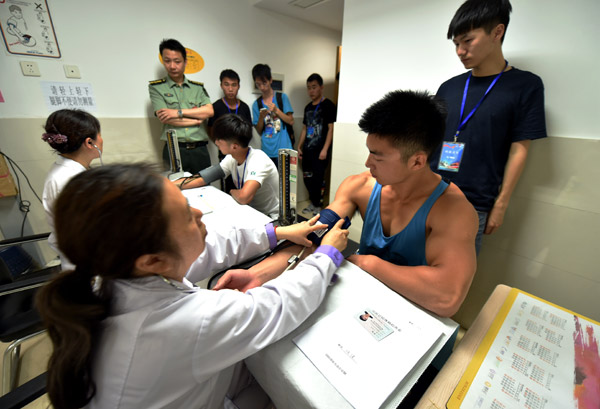
Student undergo military medical checkups in Nanjing, Jiangsu province. (Photo by Dong Rui/For China Daiy)
A growing number of scholars are suspending their studies to join the People's Liberation Army
Chen Yu, a straight-A student and a descendant of a New Fourth Army soldier who was killed during the War of Resistance Against Japanese Aggression (1931-45), had two childhood dreams. His first was to attend China's best college. His second, to join an elite unit of the People's Liberation Army.
He fulfilled both after becoming a student at Tsinghua University in Beijing.
In 2012, Chen, 17 at the time, was admitted to the country's top school. Two years later, before he started his third year at college, Chen postponed his studies and enlisted in the PLA Rocket Force, serving in Northwest China for two years.
Each year, young people from across the country suspend their studies and enlist. They are known as student soldiers.
In 2016, the number of students who applied online to join the PLA exceeded 1 million for the first time, and the proportion of students among new recruits continues to rise, according to China National Defense Newspaper. In Beijing and Shanghai, students have accounted for more than 70 percent of all applicants this year, compared with about 30 percent nationally. The PLA declined to reveal complete recruitment numbers.
Benefits package
Beijing, the city with the most colleges, offers a benefits package for students who enlist, subsidized by the municipal government and the army. Undergraduates receive about 214,000 yuan ($31,680) a year, while students at vocational colleges get 206,000 yuan.
Students at the capital's universities who enlist and serve at least two years before resuming their studies are granted Beijing hukou, or permanent residence, when they graduate and start work in the city.
Other cities and provinces offer similar packages, tailored to local conditions.
Government departments and State-owned enterprises in Beijing reserve 10 to 15 percent of their annual employment quota for discharged student soldiers.
Those given second-class military merit awards or higher are recommended for graduate school directly after demobilization, and they are excused from the national graduate entrance exam.
Lyu Jishu, a teacher of military theory at Tsinghua, said the army began enlisting students in 2002 because the rapid modernization of weaponry and equipment required better-educated soldiers.
Deng Yu, deputy director of Tsinghua's national defense education office, said the program to recruit the university's students was launched in 2005, and by the end of last year, 134 students, mostly male, had enlisted from a wide range of majors.
While that may not seem a large number, every Tsinghua student excelled in the army. Eighty-nine of them have been demobilized so far, all returning to Tsinghua having been decorated as outstanding soldiers, while 30 received first-, second - or third-class merit awards, according to Deng. "Their performances were above standard," he said.
Numbers rise
Lyu, who was dispatched by the army to lecture on military theory at Tsinghua, said only two students enlisted when the undertaking was initially launched. The following year, only one applied.
"But the number has risen recently, with more than 20 students enlisting every year," he said, adding that although large numbers of people apply to join the army, only a few achieve their ambition.
"Most failed as a result of issues such as myopia, which led to them failing the physical examination," he said.
Enlistment generally begins in June, ahead of the summer vacation. After registering online, applicants undergo initial selection procedures, followed by physical and political examinations. Those chosen are officially recruited in early September.
According to Deng, the enlistment requirements are the same for students and nonstudents, and the only real difference between them is age. For example, male applicants from urban areas are required to have graduated from high school and be ages 18 to 21, while male undergraduates age 22 or younger and male graduate students age 24 and younger are also eligible.
Most Tsinghua students enlist as they approach their junior or senior years, he added.


















































